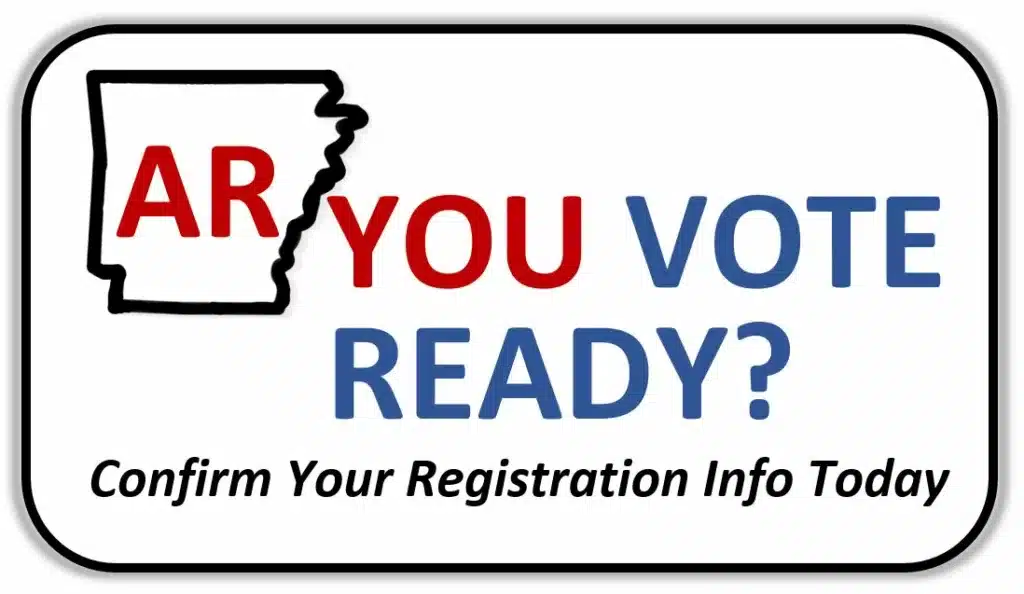
Click the button above to visit Voter View Arkansas
What is civic engagement?
Being active in your community to make a difference and bring about positive change.
Why practice civic engagement?
Because it is good for you and your community.
Civic engagement comes with many benefits and is in the best interests of the community. Here are some of the reasons why it’s worth investing in:
- Improved relationships – Engaged community members develop stronger connections with one another
- Increased social cohesion – Community members develop a sense of trust, belonging and reciprocity
- Improved community – Engaged people actively work to improve their community and care for it through volunteering, education and other activities
- Better education – Engaged citizens are more likely to read and discuss the news and share information with others
- Greater understanding – The right civic engagement opportunities can help keep the community informed about local events and opportunities
- Growth and development – Civic engagement can mean investing in community members with skills, information and motivation to contribute and make a difference
- Individual responsibility – It encourages individuals to see themselves as part of a wider community and feel responsible for contributing to and improving that community for the benefit of all
- Better quality of life – Community members can address their concerns and influence decisions to improve the quality of life for the community as a whole
- Better government – Civic engagement is essential for a functioning democratic government
Know Your Rights. Cast Your Vote. Use Your Power.
You have the power to create change! Voting is the most fundamental way to voice your opinion in a democracy.
Are you registered to vote?
Check out Voter View Arkansas to review your registration information:
https://www.voterview.ar-nova.org/voterview
Or follow this link to find out more:
https://www.sos.arkansas.gov/elections/voter-information/voter-registration-information
Get Registered! You must complete a paper Voter Registration Application. This application may be submitted in person or by mail. The application document will open in a new internet browser window.
Download an Arkansas Voter Registration Application (English)
Download an Arkansas Voter Registration Application En Español (Spanish)
Know Your Rights. Disability Rights are Civil Rights!
Full political participation for Americans with disabilities is a right. You have the right to vote.
• The United States Constitution guarantees the right to vote to all American citizens who are 18 or older.
• Arkansas law says voting locations must be accessible to voters with disabilities and allow voters with disabilities to personally and secretly execute their ballots at the polling places.
• Arkansas Law requires that you live in Arkansas, are registered in your town or city of residence and are not currently serving a prison or jail sentence.
• You may not vote in Arkansas if you are a convicted felon who has not been discharged or pardoned, or if you have been adjudged mentally incompetent as to your ability to vote.
• Guardianship agreements may affect your right to vote in Arkansas. The Arkansas Code Section for the statutory authority for guardianship is Arkansas Code Annotated §28-65-201-221. This statutory provision for guardianship requires the loss of voting privileges unless the guardianship ruling specifically includes those rights. Please speak with an expert regarding this important item. You can find an advocate by calling Disability Rights Arkansas at 1-800-482-1174.
For more information and resources on voting rights and access, please visit Disability Rights Arkansas Voting Rights webpage here: https://disabilityrightsar.org/voting-rights/
With Rights Come Responsibility
The concept of civic duty is a common thread that connects all Americans. Civic duties are based on the idea that citizens are obligated to serve in and maintain their government. In return, the government guarantees rights and protections for the citizens. Remember – with rights come responsibilities.
A civic duty is an action or responsibility expected of every member of a society. Generally accepted examples include obeying laws, serving on juries, paying taxes to the government, voting in elections and doing volunteer work. Many believe these civic duties are the basic tenets of citizenship.
Cast Your Vote
Voting is a tool for expressing our voices and opinions. Voting gives our communities access to increased opportunities and resources. Voting in elections, while not mandated in the United States, is considered a civic obligation. Are you registered? If not, get registered! Complete a paper application and submit it by mail or in person.
Absentee Voting
Arkansas offers absentee ballots by mail to voters who will be unable to vote in person. All other voters are expected to vote in person. Click here to find out more about absentee voting in Arkansas.
Download an Arkansas Application for Absentee Ballot: Arkansas Absentee Ballott
RETURN THE APPLICATION TO YOUR COUNTY CLERK. Find your County Clerk: Arkansas County Clerk Search
You may contact the Arkansas Secretary of State’s office with any questions or concerns at [email protected]
Use Your Power
Volunteerism can take many forms, such as becoming an advocate for issues important to you, your family and your community. Advocacy is a form of civic participation, much like voting. When you vote, you send a message about which candidates you want in office. Advocacy is taking your vote a step further and continuing to use your power.
Your voice is powerful. Tell your elected officials what issues you’d like them to act on and why those issues are so important to you and your community.
Legislative Advocacy
It is extremely helpful to have strong allies in the legislature. Get to know where legislators stand on issues and find those who are sympathetic to disability issues. Legislators interested in working on these issues often have a personal connection to someone with a disability. Building relationships with legislators opens the door to work more closely with them to get bills introduced, to help in drafting the language, in shaping the debate on the issues, and in getting legislation signed into law.
It is most beneficial to establish and maintain a consistent relationship with legislators in-between sessions, when your legislator has more time, so that when a bill becomes active you can easily contact your legislator for action.
Be an active advocate:
- Attend candidate forums or town hall meetings that are held by legislators and candidates.
- If your state legislature is in session, attend legislative committee meetings, hearings, etc.
- Raise disability issues and ask questions.
- Respectfully hold elected officials accountable to promises made.
For more tips on effective legislative advocacy, check out our Effective State Legislative Advocacy document.
Community Life Engagement
What is Community Life Engagement?
Community Life Engagement refers to supporting people with IDD to access and participate in their communities – outside of employment – as part of a meaningful day. Also referred to as community-based non-work, wraparound supports, holistic supports, or community integration services, Community Life Engagement activities may include volunteer work; postsecondary, adult, or continuing education; accessing community facilities such as a local library, gym, or recreation center; participation in retirement or senior activities; and anything else people with and without disabilities do in their off-work time.
There is an online toolkit available for disability service agencies, provider organizations and direct support professionals. The Community Life Engagement toolkit is a project of the Institute for Community Inclusion at UMass Boston. You can click here to find out more and access the toolkit.
Public Comment
What is a public comment?
A public comment is a comment to a federal and/or state agency providing relevant feedback to a proposed rule or regulation under consideration by the government.
Who can make a public comment? Everyone! Public comments are open to all people (individuals, organizations, other agencies, business owners, stakeholders, etc.) interested in the proposed regulation.
Follow these links to find resources from the US Department of Health and Human Services and the Association of University Centers on Disabilities on public comments:
How to Participate in the Rulemaking Process
Public Comment and Regulations
Why is providing comments so important? Participating in this process ensures that YOU have a say in how you and your loved ones are served through government/public systems.
According to the Harvard Law School’s Center for Health Law and Policy Innovation, Public Commenting is an important opportunity to make your voice heard. It is essential to provide input in the development of effective rules and regulations that serve your community. Find out more in this document: Why Public Comments Matter
Resources
2025 Determined Constituent Guide – Click to Download
This Guide includes information about the Arkansas State Capitol, how best to contact lawmakers, information specific to this year’s fiscal session, and more. During session, lawmakers generally meet Monday through Thursday. The Capitol is located at 500 Woodlane Street, Little Rock, AR, 72201. The Capitol is generally open from 8:00 AM to 5:00 PM weekdays. Parking and other information is available at sos.arkansas.gov.
Arkansas Secretary of State-Elections Division
Contact the Elections Division by visiting Room 026 at the State Capitol or
call 501-682-5070 or 1-800-482-1127 (toll free) or
Email: [email protected]
Disability Rights Arkansas (Voting Rights Webpage)
Call 1-800-482-1174
RevUP (Register, Educate, Vote. Use Your Power!)
The Arc (Voting Resources Webpage)
Civic Engagement Toolbox For Self-Advocates from ASAN (Autistic Self Advocacy Network)



